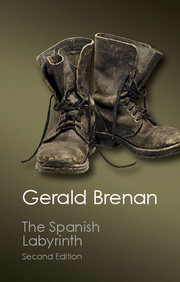Book contents
- Frontmatter
- Contents
- Foreword by Sir Raymond Carr
- Preface to the Second Edition
- Preface to the First Edition
- Chronological Table
- Political Divisions, 1873-1936. Six maps
- Part I The Ancien Régime, 1874–1931
- Chapter I The Restoration, 1874–1898
- Chapter II The Parliamentary Regime and the Catalan Question, 1898–1909
- Chapter III The Liberals and the Church
- Chapter IV The Army and the Syndicalist Struggle in Barcelona, 1916–1923
- Chapter V The Dictatorship
- Part II The Condition of the Working Classes
- Part III The Republic
- Three sketch maps
- Appendices
- Bibliography
- Index
Chapter IV - The Army and the Syndicalist Struggle in Barcelona, 1916–1923
Published online by Cambridge University Press: 05 November 2014
- Frontmatter
- Contents
- Foreword by Sir Raymond Carr
- Preface to the Second Edition
- Preface to the First Edition
- Chronological Table
- Political Divisions, 1873-1936. Six maps
- Part I The Ancien Régime, 1874–1931
- Chapter I The Restoration, 1874–1898
- Chapter II The Parliamentary Regime and the Catalan Question, 1898–1909
- Chapter III The Liberals and the Church
- Chapter IV The Army and the Syndicalist Struggle in Barcelona, 1916–1923
- Chapter V The Dictatorship
- Part II The Condition of the Working Classes
- Part III The Republic
- Three sketch maps
- Appendices
- Bibliography
- Index
Summary
Considering the circumstances in which the country finds itself, the most conservative thing is to be a revolutionary.
Francisco Cambó.The European War made a deep impression on Spain. Opinion was divided along the obvious lines: the Army, the Church, the aristocracy and the landowners were, with rare exceptions, pro-German; whilst the Liberals, the intellectuals, the parties of the Left and the big industrialists of Barcelona and Bilbao were pro-Ally. The King successfully sat on the fence and till the end of the war was claimed by both sides. But no one wished to intervene: the Allies did not press their Spanish friends for help since this might have led to a claim for Fez or Gibraltar, whilst the pro-German party felt Spain to be too isolated to be able to give effective support to their side.
Besides, the whole country was enriching itself at a tremendous rate. Never had so much wheat, so many potatoes or onions been grown before or sold at such high prices. The landowners doubled and trebled their capital. The workmen’s and even the agricultural labourers’ wages rose, though an even greater rise in the cost of living usually offset this. By the end of the war most of the industrial and national debt had been redeemed and the gold reserve in the Bank of Spain had risen from 23 to 89 millions sterling. But since Spain was a sick and disjointed country (invertebrate, as Ortega y Gasset called it) the first effect of this addition of strength was to increase the power of each separate organ to fight the others.
- Type
- Chapter
- Information
- The Spanish LabyrinthAn Account of the Social and Political Background of the Spanish Civil War, pp. 89 - 123Publisher: Cambridge University PressPrint publication year: 2014



